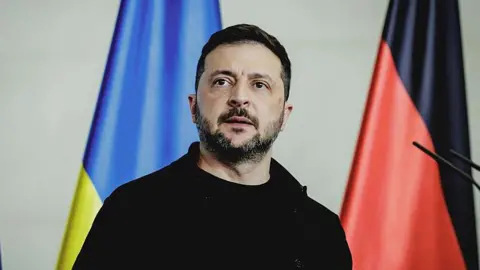In recent developments concerning the ongoing conflict between Russia and Ukraine, Ukrainian President Volodymyr Zelensky has expressed his frustrations regarding Russia’s refusal to consider a ceasefire, which he believes is complicating any potential resolution to the war. In a recent statement shared on the social media platform ‘X’, Zelensky articulated his concerns, stating that he observes Russia dismissing numerous calls for a ceasefire and has not communicated any plans on when it might cease its military operations. This situation exacerbates the challenges surrounding negotiations and peace talks.
As tensions continue to rise, Zelensky is preparing for an upcoming visit to Washington, D.C., where he anticipates discussing peace strategies with U.S. President Donald Trump. Trump has signaled his intention to urge Zelensky to forego the pursuit of an immediate ceasefire in favor of moving directly toward a permanent peace deal with Russia. Following a Friday summit with Russian President Vladimir Putin, Trump stated on the platform Truth Social that he believes achieving a lasting peace is crucial, although he acknowledges that ceasefires are often not effective.
This latest shift in Trump’s stance is notable considering his previous call for a rapid ceasefire just days before the summit. He is reportedly interested in transitioning to discussions about a permanent peace agreement instead of necessitating an intermediary ceasefire. During his phone conversation with Zelensky after the summit, he emphasized that while caution should be exercised, a definitive peace transition is essential. Zelensky echoed this sentiment, stressing the urgency of achieving a lasting and reliable peace, which encompasses critical deliverables, including credible security guarantees and addressing humanitarian concerns related to children allegedly taken from occupied territories.
The shifting dynamics of these negotiations showcase the complex layers involved in achieving diplomatic solutions in the ongoing conflict. While Trump discusses bypassing an immediate ceasefire, Zelensky insists on its necessity to ensure safety for the civilian population before engaging in talks about long-lasting solutions. Trump’s discussions with various European leaders, including the perception that a peace offer from Putin might be contingent on Ukraine’s withdrawal from the contested Donbas region, complicate Zelensky’s agenda, further heightening concerns within Ukraine about territorial integrity.
Amidst these high-stakes discussions, there are apprehensions that Trump’s approach may inadvertently pressure Zelensky into a position that prioritizes expediency over Ukraine’s sovereign rights. Previous Ukrainian stances categorically dismiss any land concessions, particularly in the regions of Donetsk and Luhansk, where Russia has exerted control and proclaimed territorial claims since its annexation of Crimea in 2014.
In a parallel development, European leaders have reiterated their commitment to maintaining diplomatic pressure on Russia, emphasizing that Ukraine’s sovereignty must be upheld and that any territorial alterations must not occur via coercion. UK Prime Minister Keir Starmer lauded Trump’s engagement as a step towards potential peace while insisting that any meaningful resolution necessitates Zelensky’s involvement, highlighting the prevailing consensus among Western leaders regarding the centrality of Ukrainian agency in negotiations.
This dual narrative of seeking an immediate ceasefire against the backdrop of potential long-term settlements underscores the intricate interplay of diplomacy in wartime. As global attention pivots back towards the region, both the Ukrainian populace and international observers remain vigilant regarding developments that affect the balance of power and peace negotiations. The overlapping interests and strategic objectives of global powers, alongside the pressing needs of the Ukrainian state, lay the groundwork for complex negotiations that may shape the future of Ukraine and its territorial integrity.
With recent statements from both Trump and Zelensky, it is evident that the pursuit of peace remains a challenging endeavor, marred by diverging priorities and expectations. As both leaders prepare for crucial dialogues, the implications of their discussions will resonate beyond the immediate conflict, influencing geopolitical alliances and the broader framework of international relations amid ongoing regional instability.












